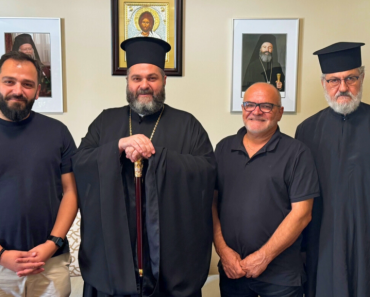Theatre MSU students will perform an adaptation of “Medea,” the classical Greek tragedy at 7:30 p.m. Feb. 26-28 and March 1 in McComas Hall Theatre.
The show is about a woman’s passionate and dreadful revenge against her unfaithful husband. The cast will also perform at 2:00 p.m. on March 2 for those who prefer an afternoon show.
Angeliki Efantis, a junior communication major focusing on theatre, will take the stage as the titular character Medea. Efantis spoke about playing such an empowered but fierce and flawed female character.
“There is not much I do to get into character. Posture and breathing have a lot to do with it,” Efantis said. “Getting out of character is more of a process.”
Efantis noted that getting into the headspace of a character who is drastically different from her has left an impact on her mindset.
“Not to say that I am secretly a murderer or anything, but pretending to be someone evil for hours every day for months starts to take a toll mentally,” Efantis said with a laugh. “I have made a point not to watch violent movies or shows in my downtime just to help not carry that mentality with me.”
However, embracing the mentality during the show itself allows Efantis to deliver sassy lines like her favorite, “May I not have a life blessed with fortune so painful or prosperity so irritating.”
Despite the violent nature of the play’s subject matter, the play addresses important topics such as people’s obligations to family members. The play also allows actresses like Efantis and Janiya Rutherford to collaborate with their fellow cast members, making the cast a sort of family that works together and shares ownership of the production.
Janiya Rutherford, a senior psychology major, performs as the nurse and a chorus member, and she spoke about the collaboration of the chorus. A defining feature of the theatre of Ancient Greece, the chorus is made up of a group of actors who perform in unison.
“Putting together the chorus work has been rewarding. Just going through the experience of what it is like to speak together as a group is very rare and comforting,” Rutherford said. “I feel connected to my other chorus members, and we have a strong relationship with each other.”
Similarly, Efantis spoke about the way all the people involved in the production work together much like the chorus.
“Theatre MSU is a program that celebrates collaboration. Opinions and ideas are shared freely between the director, designers and actors,” Efantis said. “Being able to contribute ideas to character and blocking gives me a sense of pride and ownership over the production.”
Make this or part of this a liftout quote if possible
Efantis feels pride in the collaborative performance as a whole, and she wants audience members to approach the production with impartiality.
“’This is not Tyler Perry’s ‘Madea.” You have no idea how many people have asked me if it is the same,” Efantis said. “It is an Ancient Greek play that is about 6,000 years old. Be sure to keep an open mind.”
RJ Rutherford is a senior chemistry major with a pre-pharmacy concentration who plays the role of Creon, and his is hopeful that the audience will leave the theater with a great appreciation for a story well told.
“I have enjoyed watching the process of the show come together – people growing more into their characters and the set evolving into a beautiful setting. It has truly been a wonderful experience. ‘Medea’ is such a gripping story, and it will have you on your seat anticipating every single moment,” Rutherford said. “I am beyond excited for people to see this production.”
Like these student actors, Kat Trinque, a senior double major in psychology and communications with a theatre concentration, plays an important role in the production, but she does not act.
“I am the Head Sound Designer for Theatre MSU’s ‘Medea,’” Trinque said as she explained the vital part she plays in the performance. “A sound designer is responsible for working alongside the director to create an auditory design concept and executing that design.”
Trinque had to develop a concept that worked for this particular play.
“For ‘Medea,’ my broad concept revolves around the betrayal that Medea experiences,” Trinque said, “and what outside sources add to her rage.”
Just like Efantis has a process for getting in and out of character, Trinque has a process for developing her concept and organizing her ideas.
“I read the script two times without taking any notes,” Trinque said. “This helped me to get a clear image of what is happening with each character and the overall storyline. Then I read it again, but this time I really thought about what sound effects could be included in each scene. These notated effects then went into my sound paperwork.”
Not only did she dedicate much of her time to analyzing the story and its characters, but Trinque also did her fair share of research.
“My assistant Kensi and I did a lot of research into Ancient Greek music because the director has done a traditional setting for the show,” Trinque said. “We do not have any traditional Greek instruments, but I play the cello and was able to record a lot of our background sounds. I then used a digital audio workspace software called REAPER to edit the sounds.”
The hard work of people like Trinque, Efantis, Janiya Rutherford and Rutherford both on stage and off stage has made the show possible. If you like classical mythology, suspenseful plots or theater in general, buy your tickets and prepare for this production next week.
As Janiya Rutherford said, “Be prepared for a revengeful and heart-wrenching tragedy.”
Theater-goers can buy tickets, which cost $10, for any of these performances on the university ticket website.





